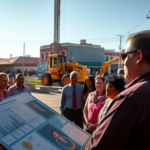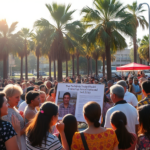Mission City Council Acknowledges Local 293 as Bargaining Unit
The Mission City Council recently took a significant step by acknowledging Local 293, a police union, as a bargaining unit. This decision, made on Monday, opens the door for potential negotiations on a meet and confer agreement, which could address critical areas such as wages and benefits for police officers. However, the council’s acknowledgment does not automatically grant the union meet and confer status, leaving the City of Mission with considerable control over future negotiations.
Background and Union Efforts
Local 293 has been actively pursuing recognition as a bargaining unit since early April, motivated by the need to represent the interests of Mission police officers in employment terms. The union submitted a petition endorsed by over two-thirds of the department’s officers. Despite this support, the city council initially dismissed the petition, citing the union’s lack of legal status as a primary reason.
The City of Mission Professional Law Enforcement Association (MPLEA) has been a vocal opponent of Local 293’s efforts. MPLEA’s criticism focused on the union’s organizational issues, including the failure to register as a business entity and complications regarding appropriate entity names. These legal challenges were leveraged by MPLEA to retain its influence within the police department.
Following a reorganization, Local 293 has resolved its registration issues, achieving compliance as a legal entity. Javier Lara, president of Local 293, hailed the council’s acknowledgment as a victory for the union. Lara emphasized that the union’s goal is to become the designated bargaining agent to benefit all Mission Police Department members.
Tensions and Concerns
The acknowledgment decision has not quelled tensions between Local 293 and MPLEA. Accusations of misinformation have been directed at both organizations, indicating a strained relationship. MPLEA President Alex Leal raised concerns about potentially losing influence should Local 293 secure meet and confer status. Despite these tensions, Lara assured city leaders that Local 293 intends to collaborate with MPLEA, stating, “Our primary goal is to reach meet and confer.”
The city’s stance remains cautious, with City Manager Mike Perez reinforcing that the council has the discretion to initiate or decline meet and confer processes. “The city sits in the driver’s seat,” Perez remarked, underscoring the optional nature of further negotiations.
Local Impact and Community Interest
For Valley residents, the decision holds significant implications. The Rio Grande Valley (RGV) has historically grappled with public sector labor issues, making developments such as these deeply relevant to the community. Transparent and equitable processes in law enforcement employment practices are crucial for maintaining public trust and ensuring community-focused policing.
The potential changes in compensation and benefits stemming from successful negotiations could impact the attraction and retention of skilled officers within the Mission Police Department. This, in turn, affects the quality of policing and public safety across South Texas, an area already facing its share of social and economic challenges.
Connections to Previous Events
The acknowledgment of Local 293 as a bargaining unit echoes broader economic discussions within the RGV. Similar sentiments were expressed during debates on employee raises discussed by the Sharyland Independent School District, emphasizing the region’s focus on fair compensation across public sectors.
Such changes reflect ongoing efforts within the RGV to address quality of life concerns and provide workers with secure, equitable employment terms, mirroring regional attempts to rectify these issues throughout various public institutions.
Future Implications and the Role of Valley Residents
While the council’s decision is a preliminary step, successful meet and confer negotiations could establish new standards for law enforcement agreements not only in Mission but potentially influencing practices elsewhere in South Texas. These decisions highlight the importance of local civic engagement, as resident participation in these dialogues remains a catalyst for accurately addressing regional workforce challenges.
Valley residents interested in following or engaging in this process can attend city council meetings or contact local representatives to express views or request updates. Such involvement ensures the inclusion of community interest in important policymaking processes that shape public employment practices.
In conclusion, while the Mission City Council’s acknowledgment of Local 293 paves the way for potential negotiations, it also underscores the necessity for thoughtful, community-centered approaches to public sector labor relations. The outcome of these negotiations could serve as a defining moment in shaping the future of police-community relations throughout the Rio Grande Valley.







